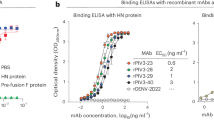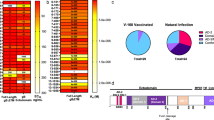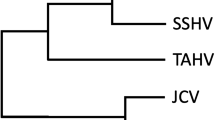Abstract
Although the events which predispose a host to measles virus persistence remain largely unknown, measles antibody has been shown to contribute to the production of a persistent infection by this virus both in vivo and in vitro. Thus, the addition of measles antibody to cells infected with measles virus promotes virus persistence1,2. Latent measles infection occurs in newborn hamsters with maternally acquired antibody after inoculation with measles virus in the immediate neonatal period3. A subacute encephalitis with measles virus persistence has been induced in weanling BALB/c mice that received antibody after virus inoculation4 and in measles-immune primates infected with a virus derived from a patient with subacute sclerosing panencephalitis5. Measles virus consists of six polypeptides, and treatment of measles-infected cells with antibody has been shown6 to alter the pattern of their synthesis. As the antigenic specificity of the antibody responsible for these observations is not known, we decided to investigate the effects of monoclonal antibodies directed against the individual measles polypeptides. We report here that a monoclonal antibody directed against the virus haemagglutinin, unlike an antibody to the virus nucleocapsid protein, is able to induce a subacute encephalitis in vivo.
This is a preview of subscription content, access via your institution
Access options
Subscribe to this journal
Receive 51 print issues and online access
$199.00 per year
only $3.90 per issue
Buy this article
- Purchase on Springer Link
- Instant access to full article PDF
Prices may be subject to local taxes which are calculated during checkout
Similar content being viewed by others
References
Rustigian, R. J. Bad. 92, 1792–1804 (1966).
Joseph, B. J. & Oldstone, M. B. A. J. exp. Med. 142, 864–876 (1975).
Wear, D. J. & Rapp, F. J. Immun. 107, 1593–1598 (1971).
Rammohan, K. W., McFarland, H. F. & McFarlin, D. E. New Engl. J. Med. (submitted).
Albrecht, P., Burnstein, T., Klutch, M. J., Hicks, J. T. & Ennis, F. A. Science 195, 64–66 (1977).
Fujinami, R. S. & Oldstone, M. B. A. Nature 279, 529–530 (1979).
Griffin, D. E., Mullinix, J., Narayan, O. & Johnson, R. T. Infect. Immun. 9, 690–695, 1974.
McFarlin, D. E., Bellini, W. J., Mingioli, E. S., Behar, T. N. & Trudgett, A. J. gen. Virol. 48, 425–429 (1980).
Birrer, M. J., Bloom, B. R. & Udem, S. Virology (in the press).
Rammohan, K. W., McFarlin, D. E. & McFarland, H. F. J. infect. Dis. 142, 608–613 (1980).
Sissons, J. G., Cooper, N. R. & Oldstone, M. B. A. J. Immun. 123, 2144–2149 (1979).
Merz, D. C., Scheid, A. & Choppin, P. W. J. exp. Med. 151, 275–288 (1980).
Author information
Authors and Affiliations
Rights and permissions
About this article
Cite this article
Rammohan, K., McFarland, H. & McFarlin, D. Induction of subacute murine measles encephalitis by monoclonal antibody to virus haemagglutinin. Nature 290, 588–590 (1981). https://doi.org/10.1038/290588a0
Received:
Accepted:
Issue Date:
DOI: https://doi.org/10.1038/290588a0
This article is cited by
-
Measles virus infection of the CNS: human disease, animal models, and approaches to therapy
Medical Microbiology and Immunology (2010)
-
Biosynthesis of measles virus hemagglutinin in persistently infected cells
Archives of Virology (1983)
Comments
By submitting a comment you agree to abide by our Terms and Community Guidelines. If you find something abusive or that does not comply with our terms or guidelines please flag it as inappropriate.



